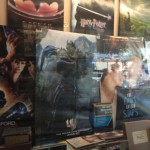An architect needs a solid plot of land to build his house. Only a plot can render a view. All of the detailed plans and beautiful drawings are just pretty pictures without it. The same can be said about all fiction. No matter how well rounded and sympathetic – or just plain pathetic – the characters are, if the story isn’t built on solid ground, it won’t stand upright when finished.
Any story can carry tension, from a school girl’s pimple on a first date to a megalomaniac’s rise to infamy. What makes any fiction interesting is how events unfold, how the heroes conquer any obstacle thrown in their way. That’s called a Plot. Let’s build a simple suspense plot that anyone can relate to.
Our protagonists, Auggie and Clair Knight, have been filing taxes on time and more-or-less correctly all 15 years of their marriage. Our story is about the Knight’s audit.
We’ll use Gustav Freytag’s Narrative Structure and his five parts to a plot to construct our story. They are:
Exposition
Rising Action
Climax
Falling Action
Denouement
In the Exposition, we draw out the motivations and goals of our protagonists. We learn the Knights are just barely getting by on Auggie’s day job as a security guard at the marina. We get a sense of what might happen if he lost his steady income, or the home’s septic system backed up again. Exposition rounds out the main characters and gives rise to the inciting incident, that one event in the story that throws down the challenge.
In our story, the Rising Action begins when the Knights get an audit notice in the mail. Tension is introduced when Auggie can’t find some of the receipts the IRS has asked him to produce. More tension comes when Clair, an accounting grad who’s done their taxes all these years, reminds him that they’ve never reported his moonlighting income from helping friends sell boats on eBay. Some years, that amounted to $4,000 of extra, undeclared income.
The length of your piece gets determined right here. If you want a longer story, you could, for example, introduce an antagonist. Say, one of Auggie’s boat buddies or an old college pal of Clair’s. But we’ll keep this story short. You – the writer – continue to pull the threads tighter and tighter as Rising Action builds towards the day of the IRS audit. Let’s say you paint the protagonists in the beginning as mostly likeable characters. Their only real flaw is a little cheating on their income taxes. Auggie and Clair trod along, blissfully hoping the IRS doesn’t know about the boat sale commissions. The closer they get to that date, the more the Knights learn of the dire consequences they’d face – huge fines, penalties, possibly jail time and certainly a federal criminal record – if they got busted. None of which they can afford, and Auggie reminds her that he can’t hold his security job with a federal record. The Knights try to stay calm on the surface, but they worry and act nervous. Their tension increasingly rubs off on their relationship with each other, with their kids and the rest of your characters.
Freytag’s third element of plot is Climax. In our story, that would be the IRS audit. The Climax should be confrontational, a spell-binding scene that is both drawn out and shattered into sharp shards of action. This is not the end of your story, and far from the end of the action, but it should be your most realistic, best drawn scene in the story so far.
Then the author introduces the twist. Say, a slip of the tongue by Clair about how easy it is to sell stuff on eBay. This raises the IRS reviewer’s eyebrows, and both Auggie and the reader see it.
The Knights are only too glad to pay $124.50 for the few receipts they can’t produce and get out of there as fast as they can. Clair and Auggie high-five in the car and start to think they’ve dodged the bullet. They start laughing about it and bragging to each other how easy that had been. The reader feels for them, one way or the other.
What follows the Climax is called the Falling Action, and this where your story can take several twists and turns with the events you first brought out in the Exposition. Falling Action can take any direction the author likes so long as it advances the story forward.
This is the real fun stuff to dream up. Say, our heroes celebrate that night in a fancy restaurant and then get all lovey-dovey after the kids go to bed. Three days later Auggie comes home and tells Clair he’s just had the best day ever at work. Clair tells him that the septic’s just backed up into the kid’s sandbox again. Oh, and they got another IRS audit letter. This one for unreported income. Later that night, Auggie freaks out when he finds himself locked out of his eBay account. The Falling Action is the back-and-forth between winning and losing battles with all of these elements, with the ever-present IRS always looming. Our heroes fight on through the Falling Action to eventually claim victory over some, if not all, obstacles. Or they get their due comeuppance on every turn of the page, or Auggie gets very foggy and Clair becomes very clear, depending on which way you want to say goodnight to your readers.
Caution: don’t let any of your subplots take over your story. Resolve all of them, but always stay focused on the main event.
The last part of Freytag’s structure is called Denouement, or the finale. This is where all of the accomplishments of the story are summarized. If the author has done his job right, in suspense anyway, Denouement is reduced to a page or a paragraph. Why? Because all of the accomplishments will have already been shown in the Falling Action scenes. There’s no tension left, just afterglow. In our story, that would be Auggie and Clair sitting on the pier toasting warm beer under a starry night and saying it could have been worse. Period.
There’s one plot line, start to finish. Just flavor with mouth-watering prose, give it a tasty title and a satisfying ending. Let it stew in suspense for a few thousand words and you’ll have it.
Freytag’s formula is not parsed equally. In all my writing, Exposition is painted with a wide brush and is never more than 10% of the story’s length. The details of these broad strokes come out in the Rising Action, which is about 40-50% of what needs to be said. The Climax is about 2%. Falling Action is usually another 40-50% because all the Exposition and conflicts created during the earlier parts now need to be resolved. Anything not resolved by this point is Denouement.
Think of our architect friend presenting the keys to this great house when finished, after every detail has been polished. If the plot is beautifully landscaped, then what more could he possibly say?
Next Month, Minutiae. ‘Nuff said.
Note: from August 1st through August 7th, Amazon.com is promoting a sale on my two novels in their Kindle bookstore. This is a great opportunity for those who likes to e-read fiction to save a couple of bucks. Both Seoul Legacy, The Orphan’s Flu and The Freya Project will be available that week for just $0.99. (67% off Retail of $2.99) So, please tell two friends to tell two friends to tell two friends. You can read the synopsis (Amazon’s “Book Description”) by following the links above. Please note this sale is on e-books only. First edition print books are also available through Amazon. Since all print versions come from BirchwoodBooks.com, I’ll be happy to sign or personally inscribe any orders for print. Enjoy! –Phil
Print books:
Seoul Legacy, The Orphan’s Flu (trade paperback)
The Freya Project (hardcover, trade paperback, ltd. ed.)






